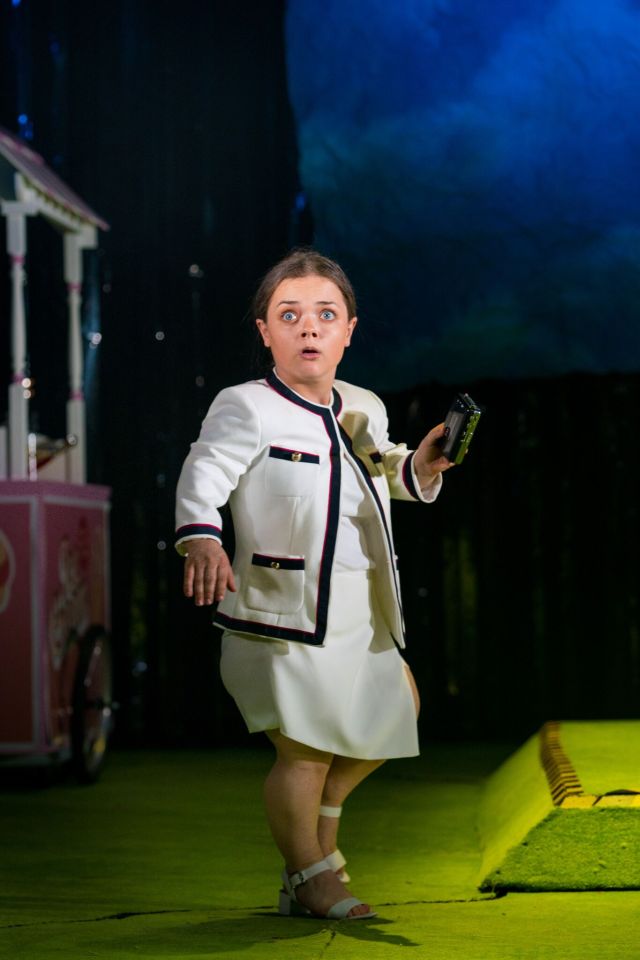Pity, Royal Court review - whacked-out and wearing | reviews, news & interviews
Pity, Royal Court review - whacked-out and wearing
Pity, Royal Court review - whacked-out and wearing
Collegiate-style Armageddon takes over the Court mainstage

The apocalypse arrives as a series of collegiate sketches in the aptly-named Pity, the Rory Mullarkey play that may well prompt sympathy for audiences who unwittingly find themselves in attendance.
Society, and the individuals unlucky enough to be ensnared within it, flame out in more or less every way imaginable throughout the 110 interrupted minutes of Pity, which sets a quick-aborning romance against a world that invites comparison with such unlikely equivalents as Titus Andronicus: bodily evisceration gets quite the look-in here, as well. Amidst the physical and psychic carnage, words nonetheless prevail. Mullarkey knows how to write compelling set pieces, and gives a Postwoman (Siobhán McSweeney) a Joycean narrative late-on that one can imagine becoming audition material catnip with time.  But the prevailingly whimsical, larky tone proves less a running ironic commentary on events than a dramatic strategy pushed to breaking point and beyond. Thank heavens, in context, for the shape-shifting caprice of Chloe Lamford's ever-inventive designs, and a busy sound design from Tony-winner Pete Malkin that does rather more than the writing to land the play somewhere in between the landscape of a comic book on the one hand and Armageddon on the other. (That said, this play is a model of cohesion compared, say, to the Hampstead's recent Genesis Inc.)
But the prevailingly whimsical, larky tone proves less a running ironic commentary on events than a dramatic strategy pushed to breaking point and beyond. Thank heavens, in context, for the shape-shifting caprice of Chloe Lamford's ever-inventive designs, and a busy sound design from Tony-winner Pete Malkin that does rather more than the writing to land the play somewhere in between the landscape of a comic book on the one hand and Armageddon on the other. (That said, this play is a model of cohesion compared, say, to the Hampstead's recent Genesis Inc.)
 The setting is an ordinary English market town where the local brass band plays, of all musical theatre selections, "Hello, Dolly!", even as the town will itself soon be saying hello to snipers, toy tanks, a war between differently-coloured adversaries and a female Prime Minister who can't quite remember where exactly she is and then has a meltdown into her mic. (Helena Lymbery, pictured above, nails that role, alongside several others.) You enter the theatre from the rear to find a jolly display of drinks and ice cream, the (often-antic) good cheer a distraction from the disembowelment that lies in wait. (The ever-buoyant Francesca Mills, pictured above, looks primed to party the night away.)
The setting is an ordinary English market town where the local brass band plays, of all musical theatre selections, "Hello, Dolly!", even as the town will itself soon be saying hello to snipers, toy tanks, a war between differently-coloured adversaries and a female Prime Minister who can't quite remember where exactly she is and then has a meltdown into her mic. (Helena Lymbery, pictured above, nails that role, alongside several others.) You enter the theatre from the rear to find a jolly display of drinks and ice cream, the (often-antic) good cheer a distraction from the disembowelment that lies in wait. (The ever-buoyant Francesca Mills, pictured above, looks primed to party the night away.)
If we're clearly going to hell in a mock-deadpan handbasket, Mullarkey does at least insist upon the power of words to erect some sort of defence. While romance blossoms between the doomed Daughter (Sophia Di Martino) and a person known simply as, well, Person (Abraham Popoola), the two are soon conjoined with Postwoman in a gathering cascade of language in which words pour forth with abandon ("balustrade" and "incipient" to name but two), until such time as the irreversible decimation lands Person on a tropical island, sipping cocktails and reading novels. Quite who is still left to mix those cocktails is a narrative nicety with which Pity isn't overly concerned. What price life, the play finally asks, if there is no one left with whom to live it, but one can at least assume that Broadway composer Jerry Herman makes his way onto Person's Desert Island Discs.
rating
Share this article
The future of Arts Journalism
You can stop theartsdesk.com closing!
We urgently need financing to survive. Our fundraising drive has thus far raised £49,000 but we need to reach £100,000 or we will be forced to close. Please contribute here: https://gofund.me/c3f6033d
And if you can forward this information to anyone who might assist, we’d be grateful.

Subscribe to theartsdesk.com
Thank you for continuing to read our work on theartsdesk.com. For unlimited access to every article in its entirety, including our archive of more than 15,000 pieces, we're asking for £5 per month or £40 per year. We feel it's a very good deal, and hope you do too.
To take a subscription now simply click here.
And if you're looking for that extra gift for a friend or family member, why not treat them to a theartsdesk.com gift subscription?
more Theatre
 Ragdoll, Jermyn Street Theatre review - compelling and emotionally truthful
Katherine Moar returns with a Patty Hearst-inspired follow up to her debut hit 'Farm Hall'
Ragdoll, Jermyn Street Theatre review - compelling and emotionally truthful
Katherine Moar returns with a Patty Hearst-inspired follow up to her debut hit 'Farm Hall'
 Troilus and Cressida, Globe Theatre review - a 'problem play' with added problems
Raucous and carnivalesque, but also ugly and incomprehensible
Troilus and Cressida, Globe Theatre review - a 'problem play' with added problems
Raucous and carnivalesque, but also ugly and incomprehensible
 Clarkston, Trafalgar Theatre review - two lads on a road to nowhere
Netflix star, Joe Locke, is the selling point of a production that needs one
Clarkston, Trafalgar Theatre review - two lads on a road to nowhere
Netflix star, Joe Locke, is the selling point of a production that needs one
 Ghost Stories, Peacock Theatre review - spirited staging but short on scares
Impressive spectacle saves an ageing show in an unsuitable venue
Ghost Stories, Peacock Theatre review - spirited staging but short on scares
Impressive spectacle saves an ageing show in an unsuitable venue
 Hamlet, National Theatre review - turning tragedy to comedy is no joke
Hiran Abeyeskera’s childlike prince falls flat in a mixed production
Hamlet, National Theatre review - turning tragedy to comedy is no joke
Hiran Abeyeskera’s childlike prince falls flat in a mixed production
 Rohtko, Barbican review - postmodern meditation on fake and authentic art is less than the sum of its parts
Łukasz Twarkowski's production dazzles without illuminating
Rohtko, Barbican review - postmodern meditation on fake and authentic art is less than the sum of its parts
Łukasz Twarkowski's production dazzles without illuminating
 Lee, Park Theatre review - Lee Krasner looks back on her life as an artist
Informative and interesting, the play's format limits its potential
Lee, Park Theatre review - Lee Krasner looks back on her life as an artist
Informative and interesting, the play's format limits its potential
 Measure for Measure, RSC, Stratford review - 'problem play' has no problem with relevance
Shakespeare, in this adaptation, is at his most perceptive
Measure for Measure, RSC, Stratford review - 'problem play' has no problem with relevance
Shakespeare, in this adaptation, is at his most perceptive
 The Importance of Being Earnest, Noël Coward Theatre review - dazzling and delightful queer fest
West End transfer of National Theatre hit stars Stephen Fry and Olly Alexander
The Importance of Being Earnest, Noël Coward Theatre review - dazzling and delightful queer fest
West End transfer of National Theatre hit stars Stephen Fry and Olly Alexander
 Get Down Tonight, Charing Cross Theatre review - glitz and hits from the 70s
If you love the songs of KC and the Sunshine Band, Please Do Go!
Get Down Tonight, Charing Cross Theatre review - glitz and hits from the 70s
If you love the songs of KC and the Sunshine Band, Please Do Go!
 Punch, Apollo Theatre review - powerful play about the strength of redemption
James Graham's play transfixes the audience at every stage
Punch, Apollo Theatre review - powerful play about the strength of redemption
James Graham's play transfixes the audience at every stage
 The Billionaire Inside Your Head, Hampstead Theatre review - a map of a man with OCD
Will Lord's promising debut burdens a fine cast with too much dialogue
The Billionaire Inside Your Head, Hampstead Theatre review - a map of a man with OCD
Will Lord's promising debut burdens a fine cast with too much dialogue

Add comment